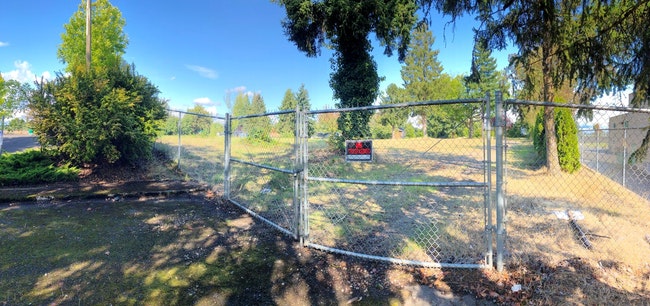
The proposed site of Sequoia Crossings, a 60-unit apartment for chronically homeless people, at 3120 Broadway St. N.E. (Troy Brynelson/Salem Reporter)
City officials say a boost of federal dollars will fast-track a housing project for chronically homeless residents in Salem which previously stalled due to a lack of funding.
The Salem Housing Authority recently received $1.5 million in federal pandemic relief funding for the Sequoia Crossings project, which would offer permanent supportive housing through 60 studio, one-bedroom and two-bedroom apartments at 3120 Broadway Ave. N.E., with case workers from homeless service provider The ARCHES Project onsite.
The program is intended to provide affordable housing and services such as medical and dental care, addiction and behavioral health treatment, education, employment referrals and counseling to help people who are chronically homeless transition into their own apartment, said Nicole Utz, administrator of the Salem Housing Authority.
Financial agreements for the project are slated to close in October followed by a little over a year of construction, with Tualatin-based contractor LMC Construction, Utz said. City officials expect it will open in the first part of 2024.
Utz said the project was delayed due to rising costs for construction and sourcing materials.
Sequoia Crossings has been in the works since 2018, when the city budgeted almost $19 million for it, but the total cost has since risen to about $24.89 million.
The new funding that helped fill that gap came as part of a $2 million federal Covid relief Salem received for crisis referral and intervention, homeless youth services, domestic violence services, new construction of affordable housing and case management.
The majority of those funds supported Sequoia Crossing, with another $47,000 going to Women at the Well for case management, about $36,000 to Northwest Human Services for youth services.
The portion for Sequoia also includes $4,000 to pay for environmental reviews.
The project comes nearly two years after Redwood Crossings, the city’s first permanent supportive housing project, opened to server roughly 30 people with higher needs like drug addiction or those who have disabilities. It houses only single people, while Sequoia Crossing will offer space for families.
Utz said around five people have “graduated” out of the program into housing. “We have some that’ll probably say at Redwood for quite some time. Probably five plus years I would say,” she said.
Redwood is also an all-interior building, with all doors in a facility with an elevator. Utz said Sequoia will be “more apartment-style” and have individual walk-ups for residents from outside.
Sequoia Crossings will have community space for training programs and meetings such as Alcoholics Anonymous, a full kitchen that can be used for barbeques and other events, laundry facilities, bicycle storage, multiple offices and a courtyard.
“It’s going to be a beautiful building, it’s very inviting. The grounds are going to have a lot of nature or natural effects,” Utz said.
Utz said the complex will be fully subsidized with public assistance vouchers intended to help low-income people make rent payments. Half the units will be subsidized with Salem Housing Authority vouchers and the other half through permanent supportive housing vouchers from Oregon Housing and Community Services.
ARCHES caseworkers make referrals to the housing authority through “coordinated entry,” which links local service providers together through a common database with information people seeking services and the type of help they need.
The city received roughly $13 million in loans for the project, including two federal loans and one from Key Bank. Utz said 20-year projections show the city can pay back the loans, primarily through rent received.
The city also received about $9.5 million through the federal Low Income Housing Tax Credit Program, which offers tax credits to developers who build or acquire property and rehabilitate it to be used as low-income rental housing.
The rest is paid for by about $2.4 million in Salem Housing Authority contributions.
PRIOR COVERAGE:
Salem tries for state, federal grants to get affordable housing project built
Salem tries for share of new state money to push new approach to serving homeless
Contact reporter Ardeshir Tabrizian: [email protected] or 503-929-3053.
JUST THE FACTS, FOR SALEM – We report on your community with care and depth, fairness and accuracy. Get local news that matters to you. Subscribe to Salem Reporter starting at $5 a month. Click I want to subscribe!









